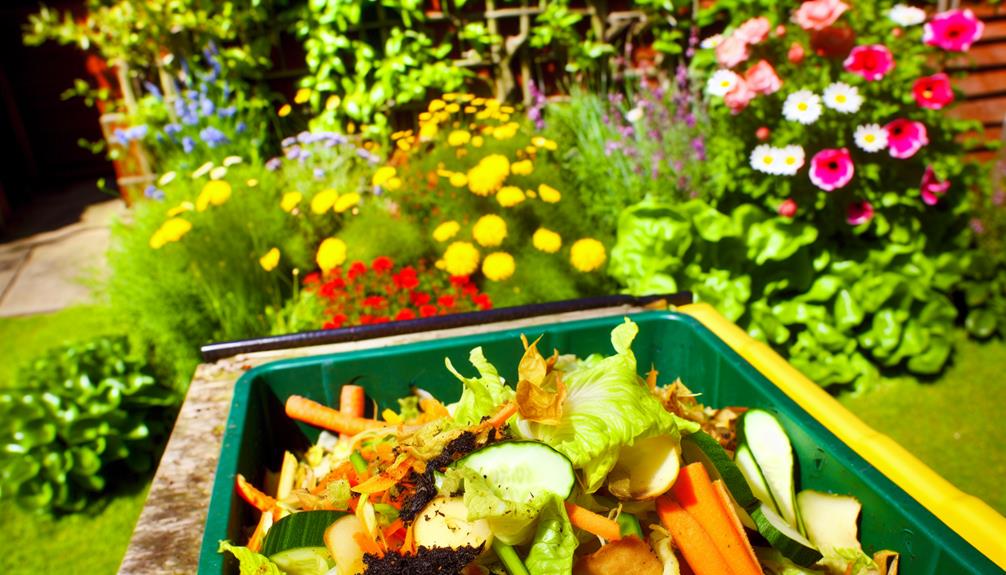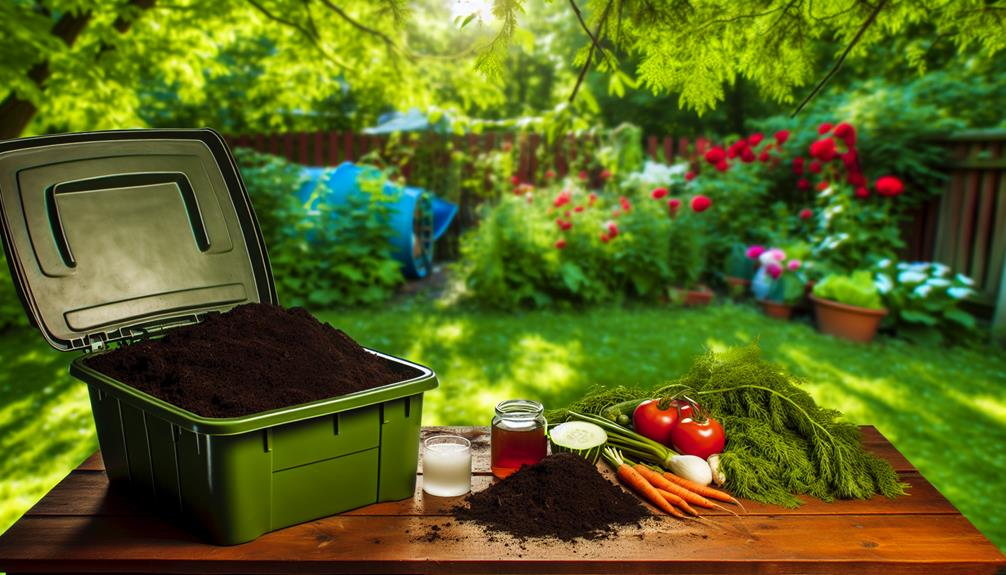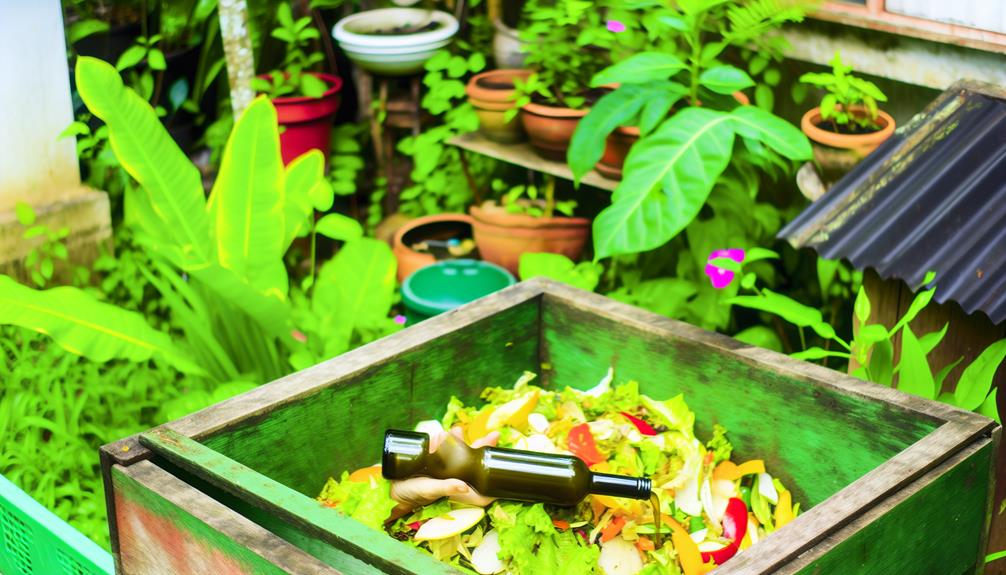

You can compost vinaigrette, but you need to manage its oil and vinegar content carefully. Excess oil can hinder water and air absorption, affecting microbial health. Pair vinaigrette with high-carbon materials like straw and regularly turn your compost to help break down the oils.
Vinegar’s acidity can disrupt compost pH, so dilute the vinaigrette with water before adding it. Make sure your compost has a balanced ratio of browns (carbon-rich) to greens (nitrogen-rich), aiming for a 2:1 ratio. Properly balancing these materials will help maintain a healthy compost environment. For more detailed composting tips, there’s more to explore.
To craft a great vinaigrette, you need to understand its core ingredients and how they interact. The main components are oil, vinegar, and emulsifying agents. Oils and vinegars come in various types, each bringing unique flavor variations to your dressing. You can use olive oil for a rich, fruity taste or go with a neutral oil like canola if you prefer something lighter. Vinegars range from tangy apple cider to robust balsamic, each contributing distinct nuances.
Emulsifying agents are essential for blending oil and vinegar into a cohesive mixture. Mustard, honey, and egg yolks are common emulsifiers that help achieve this balance. They prevent the oil and vinegar from separating, ensuring a smooth consistency.
When you mix these ingredients, start by combining the vinegar and emulsifying agent, then slowly whisk in the oil. This method allows the emulsifier to properly bind the oil and vinegar together.
Understanding these core ingredients and how they work together lets you create a variety of vinaigrettes tailored to your taste preferences. By experimenting with different oils, vinegars, and emulsifiers, you can discover endless flavor combinations that elevate your salads and dishes.
Also Read: Can You Compost Body Wash?
Many people wonder how adding oils to compost might affect its decomposition process. When you add oils, you need to take into account oil absorption and microbial health.
Oils, especially in large quantities, can create a barrier that hinders the absorption of water and air. This can slow down the decomposition process, making your compost pile less effective.
Microbial health is vital for breaking down compost materials. Oils can coat organic matter, making it harder for microbes to access and decompose it. This can lead to an imbalance in your compost pile, as microbes need a balanced environment to thrive. However, small amounts of oil, like those found in vinaigrette, can be managed.
To help with oil absorption, mix in high-carbon materials like straw or shredded newspaper. These materials can absorb the oil and help maintain a balanced compost environment.
Turn your compost pile regularly to make sure even distribution and aeration. This promotes microbial health and aids in the breakdown of oily substances.
Vinegar can impact your compost pile’s pH balance, which is important for effective decomposition. Different vinegar types, such as apple cider, white, and balsamic, contain varying levels of acidity. Adding too much vinegar to your compost can create an overly acidic environment, hindering the microbial activity required for breaking down organic material.

When you compost, maintaining a balanced pH is vital for reaping the full compost benefits. A compost pile that’s too acidic can slow down the decomposition process and negatively affect the beneficial organisms that thrive in a more neutral pH range. You don’t want to disrupt this balance, as it could lead to a less efficient composting process and result in lower-quality compost.
To avoid potential issues, use vinegar sparingly in your compost bin. If you need to dispose of vinaigrette, consider diluting it with water before adding it to the pile. This helps mitigate the acidity and ensures that your compost remains a hospitable environment for decomposition.
Also Read: Can You Compost Blood?
Maintaining your compost bin is balanced involves carefully managing the ratio of green and brown materials. To achieve best compost balance, you need to understand the green brown ratio.
Greens are nitrogen-rich materials like fruit scraps, vegetable peels, and coffee grounds. Browns, on the other hand, are carbon-rich items such as dry leaves, cardboard, and newspaper.
Start by aiming for a balance of roughly 2:1 browns to greens. This ratio ensures that your compost has the right mix to promote efficient decomposition. Too many greens can make your pile wet and slimy, while an excess of browns can slow down the composting process.
When adding vinaigrette to your compost, remember it’s considered a green material because of its organic components. To maintain your compost balance, pair it with adequate browns. For instance, if you add a cup of vinaigrette, make sure you incorporate two cups of shredded paper or dried leaves.
Mix the materials thoroughly to ensure even decomposition. Regularly turning your compost helps maintain the green brown ratio and improves aeration.
Also Read: Can You Compost Black-Eyed Peas?
When you’re composting, following best practices guarantees a healthy and efficient decomposition process. Start by selecting the right composting tools and compost bins to manage your organic waste effectively. A well-chosen compost bin guarantees proper aeration and moisture control, key factors in successful composting.

To maintain a balanced compost pile, follow these guidelines:
Yes, vinaigrette can attract pests to your compost pile. Use pest deterrents like citrus peels and establish compost barriers to keep unwanted critters out. You’ll create a thriving, pest-free compost community everyone will appreciate.
The decomposition rate of vinaigrette in your compost pile depends on microbial activity, which can vary. With the right conditions, it might break down in a few weeks. Keep your compost balanced to foster community among microorganisms.
Yes, there are health risks with composting vinaigrette. You could face bacterial growth and soil contamination. Stick to safer compost materials to keep your garden and community healthy and thriving.
You can compost vinaigrette with preservatives, but be cautious. Preservative breakdown can slow the composting process. Balance it out with natural compost additives to maintain a healthy compost pile. You’re contributing to a sustainable community effort!
Yes, the type of oil can affect composting efficiency. Oils prone to oxidation might hinder microbial interactions, slowing down decomposition. Stick to oils like olive or canola for better results, ensuring your compost community thrives.
To compost vinaigrette effectively, balance your compost bin by adding a mix of greens and browns.
Oils can slow decomposition, so use vinaigrette sparingly. Vinegar is acidic but breaks down quickly in small amounts.
Make sure you turn your pile regularly to aerate it. Avoid large quantities of vinaigrette to maintain a healthy compost environment.
By following these guidelines, you’ll successfully integrate vinaigrette into your composting routine.
